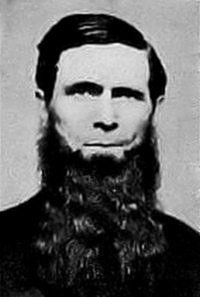Introduction

Born: October 31, 1834, Butler County, Ohio.
Died: June 7, 1878, in a train wreck in McKinney, Texas.
Buried: East Hill Cemetery, Rushville, Indiana.


Born: October 31, 1834, Butler County, Ohio.
Died: June 7, 1878, in a train wreck in McKinney, Texas.
Buried: East Hill Cemetery, Rushville, Indiana.

Knowles was the son of Albin Shaw and Huldah Griffith Whitinger, and husband of Martha A. M. Finley.
The following letter was written by Elder Kirk Baxter, pastor of Shaw’s church in Dallas, Texas:
Cleburne, Texas, June 7, 1879.
Dear Brother: - Just one year ago, to-day, Brother Shaw was killed. During his last meeting among the numerous calls to labor at other places, was one from the church at McKinney, which sent a delegation to urge him to visit there, if only for a few days. He replied, ‘As that is one of Brother Baxter’s points of labor, I will go.’
His meeting in Dallas closed on the night of the 6th of June. That night he spent at Brother Dr. Johnston’s. He telegraphed to the church at McKinney, that he and I would be there the next day.
Early the next morning there was a tremendous rain-fall, lasting two or three hours. The brethren tried to prevail on him not to go to McKinney that morning, urging that the weather was so unfavorable that he could not have a meeting if he went, and insisted that he should remain in Dallas that day and rest.
He replied, ‘No; we have telegraphed the brethren we would be there, and we must go; that there was no time for rest now; rest would come by and by.’ I met him at the depot about seven o’clock that morning, as lively and cheerful as I ever had seen him. He had bought his ticket and was ready to start.
We took a seat in the car, and, in a few moments, were off. We conversed a few moments in regard to the work at McKinney. He then took up the morning paper and looked through it. While thus engaged, I left him, and went forward to the front of the car, and was about to pass out to the coach ahead, when some one called me by name.
I turned, and saw a Methodist minister, Mr. Malloy, whom I had known years before in Arkansas. I sat down by him, and spent some time in conversation. He asked me about our meeting in Dallas, and Brother Shaw. I told him that Mr. Shaw was on the train, and just at that moment caught his eye, and beckoned to him, and he came to where we were seated.
I introduced him to Rev. Mr. Malloy, and gave him my seat, and took the next one. Mr. Malloy asked him to tell him the secret of his success in protracted meetings, which Brother Shaw proceeded to do in a very earnest manner, saying he depended much on the power of song; preached Christ; always kept Jesus before the people; made them feel that they were sinners, and needed just such a Savior as he preached; that he never became discouraged; had confidence in the gospel truth as the power of God; that he loved his work, and became wholly absorbed in it; and added: ‘Oh, it is a grand thing to rally people to the Cross of Christ.’
At that moment, I turned to see if we were in sight of McKinney, and I felt the car was off the track, bouncing over the ties. I did not feel in any danger; did not know that we were on an embankment, and expected that we would check up in a moment or two. I saw Brother Shaw rise from his seat, and realizing at once that the car was going over. Not a word was spoken. I saw Brother Shaw alive no more.
All became as dark as night. When I came to myself, the coach was at the bottom of the embankment, and I was its only occupant. I looked round, but all were gone. When I got out, I saw the passengers on the railroad track above me, and made my way up to them.
The first one I met was Mr. Malloy, with whom Brother Shaw was seated at the time of the accident. I said to him, ‘Have you seen Brother Shaw.’ ‘No,’ said he, ‘I fear he is under the wreck; but he saved my life by pushing me from the position in which he himself fell.’
I waited to hear no more, but ran down to the wreck, looked in, and saw a man’s hand pointing upward out of the water. It was Brother Shaw’s hand.
I called for help, and in about fifteen minutes he was taken lifeless from the water. Portions of the wreck had to be cut away with an ax before the body could be reached and removed.
I had the body placed in the baggage-car, which had not been thrown from the track, and sent to McKinney, where it was taken charge of by the brethren and placed in the church. I sent a telegram to Dallas, telling the sad news.
In a short time, a deep gloom pervaded the whole city, as from house to house passed the sad words, ‘Brother Shaw is dead.’ Quite a number were injured by the accident; some very severely. My own injuries were of a serious nature, much more so than I at first supposed.
Such was Brother Shaw’s last day on earth.